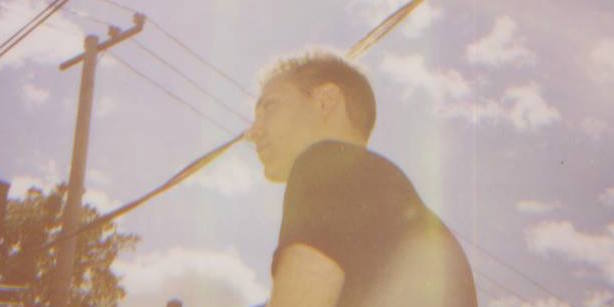 Music
Music
Event Cloak offers life strategies
by Jesse Locke
June 9, 2015
Tips from the Montreal electronic artist: Quit your job and float away.
Photo: Madison Dinelle
For the past five years, Nick Maturo has left a vapour trail through the world of experimental synth music. He began as one half of the fried kosmische duo Sundrips and a co-founder of the currently paused cassette label Fadeaway Tapes, while also drifting out grip-or-they’re-gone solo releases as Event Cloak. That’s not to mention my personal favourite project, the Ghostbusters-referencing Tobin’s Spirit Guide.
Last month saw the long-awaited (by yours truly at least) Life Strategies, Maturo’s first Event Cloak offering on vinyl from the forward-thinking Orange Milk label. Lifting off from a pool of influences as diverse as the avant-compositions of ECM Records and abstracted forms of 1980s synth-pop, it soars above the clouds into a weightless, shimmering space. From the heavenly vocals and pianos of “Everything Must Go” to the merry-go-round minimalism of the title track, it careens to a finish with the glitched/chopped sample freakery of “Situation Comedy.”
In his lengthy responses to my questions below (“I’m in thesis writing mode so I’m not used to brevity these days” he jokes), Nick touches on his escape from the 9-to-5 grind, the current day cassette game, and a bizarre interaction with Ben Mulroney.
I typically avoid asking questions about album or song titles, but Life Strategies jumps out at me as something that might be personally meaningful. I know you recently quit a day job that was sucking your soul, so does the name tie into that? What other sorts of strategies have been on your mind recently?
At first glance, Life Strategies maybe sounds like the caption on a motivational poster, but it’s actually an instance of my fairly cynical sense of humour: It’s basically ‘Coping Mechanisms’ but jazzed up to poke fun at a kind of enterprising self-help language of forced positivity. In that sense, I guess it follows thematically from my previous release Reprogramming, which was supposed to be all about resetting and making a positive change; I guess this one ended up being loosely about “OK, that didn’t pan out, things actually got kind of shitty, how do I deal with this?” As for the soul-sucking job, it’s not an explicit reference, but I can say that this record would not have been possible if I was still stuck in the 9-to-5 grind, so solidarity to anyone slightly hungover and watching the clock in a cubicle while reading this.
You’ve made a few appearances on compilations, but this album is your first major release since 2013. Did you approach things differently knowing it would be on vinyl vs. cassette, with a longer timeframe for gestation/creation?
I had actually been wanting to do a proper full length release on vinyl for a while because it felt like that was the obvious next step in terms of building musical credibility, but I didn’t intentionally plan this album to be that album. I was very cautious about putting any additional pressure on myself after being inactive for so long. In fact, Life Strategies was originally supposed to come out on a local tape label with a slightly different tracklist but that fell through, and fortunately Seth and Keith at Orange Milk were enthusiastic about working together.
Regardless of format, my approach to this record was all about taking my time, not rushing anything just for the sake of getting it out, and letting the pieces develop organically until they really felt ready. In a lot of ways, this was super frustrating because my natural inclination is to get antsy and rush things, but I think it ended up being an incredibly valuable experience in learning not only to focus more on the details but also to allow myself to derive a kind of pleasure from that careful attention. Of course, the flipside to this was some genuinely bleak OCD exercises in DAW automation curves and ‘just-noticeable difference.’
This album has a light, melodic quality that hasn’t always been there in your music. Were you trying to wipe away some of the drone zone and emerge with a clearer sound?
To some degree, yes. My tendency in the past has been to start a piece of music, not know how to finish it, and then just throw a bunch of extra stuff on it – quantity over quality – which had understandably become really unsatisfying. Before starting these pieces, I had tried to shift this approach by getting into the ‘outsider dance music’ headspace and trying to focus more on rhythm, but this wasn’t playing to my strengths and ended up feeling like a real dead end. So I decided instead to really work on melody, which is at the end of the day what I love most about music, and try to push compositional development, rather than just rely on static loops or drones or whatever. A big part of this was trying to give individual parts more room to breathe, which I think to some degree resulted in the lightness of the music. But I think I’m also just increasingly obsessed with the idea of air and space in my work.
I know you’re a voracious music fan as well, so can you share any of your major influences on this album?
My listening habits really shifted about midway through this record, from more rhythmic, glitchy stuff to ambient and orchestral music. In fact, this shift caused a bunch of the pieces to change drastically. Anyway, a few things that had a big impact on me: A lot of ECM stuff, particularly Eberhard Weber’s The Following Morning, and this one beautiful record Eos by Terje Rypdal and cellist David Darling. So much Pat Metheny, a bunch of Roger Eno, and the Gigi Masin compilation on Music From Memory (this never left my turntable/iPod for like three months). I also developed a deeper appreciation for the last couple of Talk Talk records, along with my undying love of vintage 4AD. Then there’s some relatively more pop stuff that worked its way in, particularly China Crisis and Depeche Mode, who are perennial favourites.
Can you tell the people a bit about Rob Feulner, the analog/VHS wizard who made your video for “False Positive”?
Rob is a close friend. We went to high school together and grew up in the same suburban town so we go back a while and have been talking about/listening to/making music together throughout. Rob has a real knack for working with VHS cassettes and exploring imagery and textures that on the surface trade in nostalgia, but when you dig deeper there’s actually so much more going on in the way he’s often physically working with the tapes themselves (this man risks electrocution for his art!). I’ve been very lucky to have Rob do live visuals for a number of my shows so naturally he was the first person I thought of when Orange Milk and I talked about a video for the album launch. Given the choice of source material, it was also a great opportunity for us to just watch and talk about Unsolved Mysteries under the guise of art.
What’s the state of the cassette game in 2015, in your opinion? Are the diehards still going strong, and is it possibly even due for another comeback?
I’ll try not to put my foot in my mouth here, because I’m pretty out of the loop these days and hardly qualify as an authority on the subject anymore (if I ever was), but I think 2014 and 2015 so far have been really exciting for quality tape releases (although I’m extremely skeptical about this ‘year of the cassette’ slogan I’ve seen in other places). Personally, I’ve found a renewed appreciation for the format and I’ve bought more tapes this year than the past few combined. But it also has a different feel to me now compared to when I got involved circa 2009. There are a lot of great labels that are really cultivating a polished, professional kind of aesthetic, but consequently there’s maybe less visibility for the pure outsider ‘c40 of a dude groaning into a vocoder with blatant magic mushroom cover art’ stuff. I guess this can be both good and bad, depending on where you stand.
Has Fadeaway Tapes faded away forever? What’s up with your label co-head and collaborator Ryan Connolly these days?
Ryan’s presently back living in the States, drinking incredible craft beer and listening to boogie records. Unfortunately there’s just not a lot of time to invest in the label for either of us right now, but I hesitate to say that Fadeaway is finished. As long as Ryan has undubbed tapes from 2010 in his closet, it can never truly die.
I’m a big fan of your curmudgeonly online presence, which seems to focus on soccer, food and politics as much as music. Are these things still taking up the majority of your waking hours?
For better or worse, a lot of my time does go towards watching televised sports… But actually, I’m desperately trying to finish up a Masters thesis (the stress from that is probably contributing to the perceptible crankiness), so that’s taking up the majority of my time these days, to the detriment of making music. The stuff I throw up online is just a way for me to try to manage my downtime as best as I can by balancing fun dumb stuff and things that are actually important that I really should be paying attention to.
Can you talk about your recent interaction with Ben Mulroney?
Wow, that was a weird one. Speaking of that “curmudgeonly online presence,” I made a snarky comment basically suggesting that if Ben Mulroney tweets a hashtag, that hashtag is junk. For whatever reason, he noticed this and opted for the ‘kill em with kindness’ approach, deciding to compliment my music (so, so weird) while at the same time criticizing my “chirping ability” (‘chirping’ being hoser-speak for talking shit). I was basically so dumbfounded by this whole experience that all I could muster in response was some regrettably dopey “well gosh, thanks”-type reply. That being said, I remain optimistic about the prospect of licensing my music to etalk in the future.
You’ve also been outspoken about some of the musical happenings in Montreal which you feel no connection to. Is there still a smaller circuit of artists and venues that you align yourself with? Is the Mile End tour circuit alive and well?
Well, first of all, let me clarify that me not feeling any connection to something should definitely not be looked at as any kind of definitive statement on that thing’s validity. There’s plenty of stuff that I don’t get or that is not for me to get in the first place, either of which is totally fine. The stuff that actually bothers me usually stems from concerns for my own particular corner of the Montreal musical community and the many talented people who I believe are often underrepresented, as well as a general preoccupation with a lack of stylistic diversity (to say nothing of issues of artist diversity, which is both a broader and more pressing issue in and of itself).
There’s certainly no shortage of artists in Montreal who I consider kindred spirits, as well as people doing totally different stuff that I respect immensely: Francesco De Gallo is the master, Le Révélateur is somehow getting better which should be impossible, Kara-Lis Coverdale has a really mind-bending sound, CFCF is a frighteningly talented songwriter, Karl Fousek is king of the modular… The list truly goes on. In terms of the venue situation, I don’t really know much about the post-La Brique loft scene because I rarely leave my living room anymore, but given that I can still carry a synth wrapped in a garbage bag to Casa Del Popolo in under 15 minutes, the Mile End tour circuit is alive and well!
Tags: Music, Cancon, Interviews, emerging, event cloak





